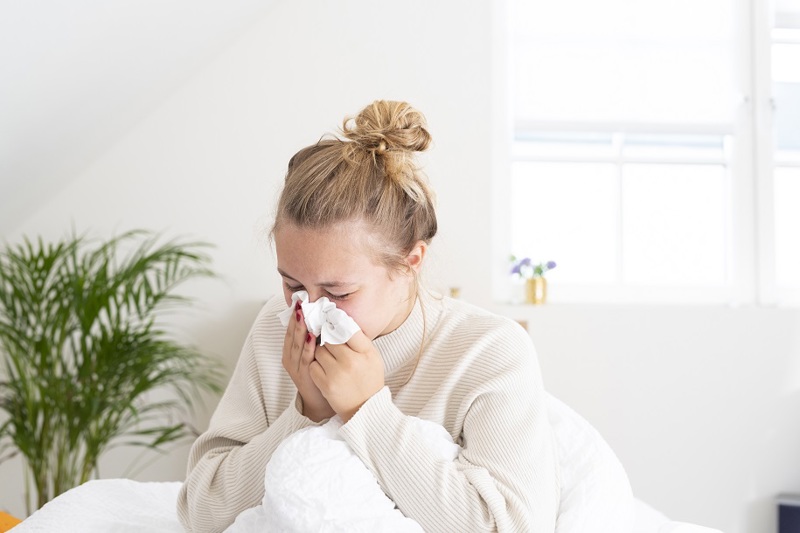Flu symptoms now plaguing Finns - effective home remedies to beat the flu
Headache, sneezing, coughing, fever - these familiar symptoms are signs that the flu virus is making an appearance. The same cold symptoms are currently being highlighted in the contacts from Terveystalo's occupational health clients. Occupational health specialist Toni Vänni tips on the most effective ways to fight the flu and advises when it's time to return to work after an illness.

There are currently several different viruses circulating in Finland that cause flu symptoms. According to THL, the threshold for an influenza epidemic has now also been crossed, and there is clearly a virus in circulation. The most contagious diseases are either in the early stages of symptoms or even before they appear.
– A fever is a likely sign that the disease is contagious, but in a basic flu even that usually lasts only a few days. Within a couple of days, the infectiousness typically drops significantly and other symptoms also subside," says Vänni.
Respiratory tract infections are also reflected in the Symptom Assessment Tool used by Terveystalo's occupational health customers in digital channels. Before starting an appointment or making an appointment, the customer is asked to describe their symptoms, which the Symptom Assessment tool uses to analyse the answers given and, based on the urgency, directs them to the right channel, at the right time, and to the right specialist. Recently, up to 40% of the visits for symptom assessment have been related to cold symptoms.
– The vast majority of colds can be treated at home. For common symptoms, the first step is to remind the customer of the self-reporting policy, if the organisation has one in place. This frees up professional consultation time for those who need it most urgently, i.e. those whose symptoms are either prolonged or, by their nature, require clinical investigation. In cases of severe symptoms, rest is in order, but you can return to work as soon as you are fever-free and the symptoms have started to subside," advises Vänni.
What are the best ways to beat the flu?
You can't protect yourself against the flu with a vaccine like you can against influenza, but luckily there is something you can do. Toni Vänni, an occupational health specialist, recommends the following measures when the flu strikes.
1. Rest and hydration
If the flu does strike, the most important thing is to rest and stay hydrated. Drinking enough helps with congestion by making mucus thinner and keeps the body hydrated even when you have a fever. Avoid heavy physical exertion until your symptoms subside and you are fever-free.
2. Pain killers, paracetamol and nasal sprays
If necessary, anti-inflammatory drugs and paracetamol can be used to relieve flu symptoms such as fever or muscle aches. Sprays can be used to open a stuffy nose, as long as you remember not to use any product for very long periods.
3. Nasal cannula
Rinsing your nose with a nasal cannula will help relieve congestion, although it won't help clear the virus itself. Nasal rinsing can help maintain the health of the nasal mucous membranes and promote the removal of mucus from the nasal cavities. Using a nasal decoction may also help prevent the development of after-effects of the flu, such as sinusitis.
4. Honey
Honey as one of nature's wonder substances, is widely used in health care. Of all the flu symptoms, honey is the most effective for coughing and has also been shown to make other flu symptoms milder.
5. Zinc
Research suggests that zinc may be useful in preventing the common cold. Zinc may also slightly reduce the duration of flu symptoms if taken as soon as symptoms appear. A daily dose of at least 75 mg of zinc acetate, which is absorbed through the oral mucous membranes, should be taken to be of benefit.
6. Vitamin C
Vitamin C may prevent flu, but the amounts should be quite high, several thousand milligrams per day. However, the evidence is weaker than for zinc.
Read more articles

Terveystalo's digital services have been awarded the internationally recognized ISO27001 information security certification.
Terveystalo's information security practices, processes, and risk management are in line with international best practices.

Does massage help relieve stress? – Touch restores and calms the body and mind
Stress is not always visible on the outside, but the body does show signs when the strain increases. According to Lassi Ylönen, a trained massage therapist at Terveystalo Rela, the body often communicates stress through subtle signs.

Circular economy and artificial intelligence boost performance and improve care
At the heart of sustainable healthcare, technology serves as a tool for improving both the quality of care and accountability. Terveystalo favors solutions that combine sustainability, cost-effectiveness, and medical expertise.

Psychologist: How to make Christmas a relaxed and personal celebration
For many, the anticipation of Christmas begins when cities are decked out in seasonal lights and the first chocolates, calendars, and gingerbread cookies appear on store shelves. Christmas carols ring out and the Tonttuparaati choir sings “Kiire jo on! Kiire jo on!” (Hurry up! Hurry up!). This warm and atmospheric celebration also brings other feelings to mind: how on earth can we get through all this without losing our joy and peace in the rush?

Terveystalo and Gosta Labs deepen their cooperation: the goal is to streamline work with a superior patient information system
Terveystalo is deepening its cooperation with Finnish health technology company Gosta Labs and investing €1 million in the company as a minority investor. The aim is to jointly develop artificial intelligence solutions that improve the quality of care and the efficiency of reception work as part of Terveystalo's new patient information system, Terveystalo Ella.

First aid preparedness in companies requires action and courage
First aid skills increase resilience, but a barometer survey of Finnish organizations' first aid capabilities published in October reveals that the number of trained personnel is alarmingly low.